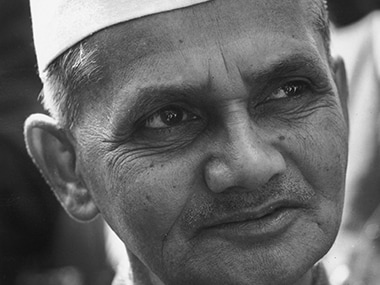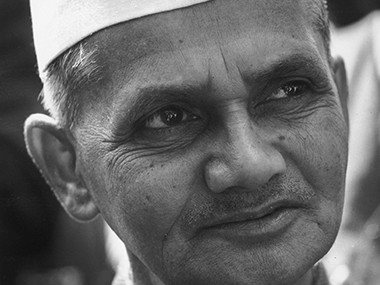New Delhi: Lal Bahadur Shastri, India’s second prime minister, was confident of subcontinental peace, which is why he signed the Tashkent Accord with Pakistan exactly 50 years ago, on 10 January, 1965. But this collapsed due to his death hours later early 11 January, an event that should be probed even though half a century has elapsed, veteran journalist Kuldip Nayar, a long-serving aide of the Indian leader, said. “Shastri was very sagacious. He firmly believed India could make peace with Pakistan but not with China,” Nayar, who was Shastri’s media advisor, reminisced in an interview with IANS, adding that it was the prime minister, who got then Pakistani President Field Marshal Ayub Khan to pencil in the words “without resorting to arms” in the first draft of the Tashkent Agreement. [caption id=“attachment_2577340” align=“alignleft” width=“380”]  Lal Bahadur Shastri. Getty Images[/caption] Under the agreement, the two countries agreed that their armies would return to the positions they held on 5 August, 1965, the day they went to war for the second time after the partition of the subcontinent in 1947. “Ayub Khan was inclined but (Pakistani foreign minister Zulfikar Ali) Bhutto stormed out of the negotiations, saying he would denounce the president (back) home. After Shastri died (in circumstances that are still suspect), and thanks to Bhutto, whatever had been achieved at Tashkent collapsed in Rawalpindi (then the Pakistani capital),” noted Nayar, still sharp as a razor in spite of being 93 years old, and possibly the only survivor of Tashkent. Reinforcing this view, Nayar recalled Ayub Khan saying on the morning of Shastri’s death: “Here lies the man who could have brought Pakistan and India close.” Ayub Khan, in fact was one of the two front pall-bearers (on the left) who carried Shastri’s coffin to the aircraft that transported it to New Delhi. Elaborating on Shastri’s sagacity, Nayar pointed to a letter the then Shah of Iran, Mohammad Raza Pahlavi, wrote to Ayub Khan in the wake of the Chinese invasion of India in 1962, asking him to send Pakistani troops to beat back the invaders. “A copy was marked to (India’s first prime minister) Jawaharlal Nehru, who sought (home minister) Shastri’s comments. Don’t accept it, Shastri said because tomorrow, if Pakistan asks for Kashmir (still a sticking point between the two nations on which they have fought four wars), we’ll be in a difficult situation,” Nayar contended. Shastri had assumed office soon after India’s first prime minister died on 24 May, 1964 in spite of the fact that it was widely felt that Nehru wanted his daughter, Indira Gandhi to succeed him. So how did Tashkent, now the capital of Uzbekistan but at that time part of the undivided Soviet Union, come to be chosen as the venue of the peace negotiations? “The Americans stepped in (after the 1965 war ended) but Shastri said, ‘No. They have given them (Pakistan) arms. We can’t trust them. The Soviets stepped in; they said come to Tashkent, known for its kababs and good food. Shastri was a strict vegetarian, but he said, let’s go.” Though military cooperation between India and the Soviet Union had begun soon after the 1962 war with China, this took a quantum leap soon after the Tashkent Accord and today, India imports almost 70 percent of its armaments from Russia, the successor state after the collapse of the Cold War superpower. Nayar also said there was much bonhomie between the Indian and Pakistani delegations, as also between the journalists of the two countries who were reporting on the talks. “We (the journalists) were staying in the same hotel. Bahut milna julna tha. Saath khate peete the (There was much camadaraderie. We used to eat and drink together.) After Shastri’s death, all of them came to sympathise with us. The next morning, even people on the street came to sympathise with us,” Nayar recalled. As for the circumstances of Shastri’s death hours after the Tashkent Accord was signed, Nayar said, “There is a general perception that he was poisoned, there should be an enquiry, even though a long time has elapsed. The government says there are certain papers; whatever papers there are, make them public.” Speaking about the future of India-Pakistan ties, Nayar saw great hope. “There are fringe elements (as evidenced in the attack on the Pathankot IAF air base soon after Prime Minister Narendra Modi’s dramatic visit to Lahore via Kabul after a state visit to Moscow), but everyone realises that peace must prevail,” he said. “Had people like Lal Bahadur Shastri been around, all this would not have happened,” Nayar concluded. IANS
India and Pakistan signed the Tashkent Accord exactly 50 years ago, on 10 January, 1965 at Tashkent in the Soviet Union.
Advertisement
End of Article
Written by FP Archives
see more


)

)
)
)
)
)
)
)
)



